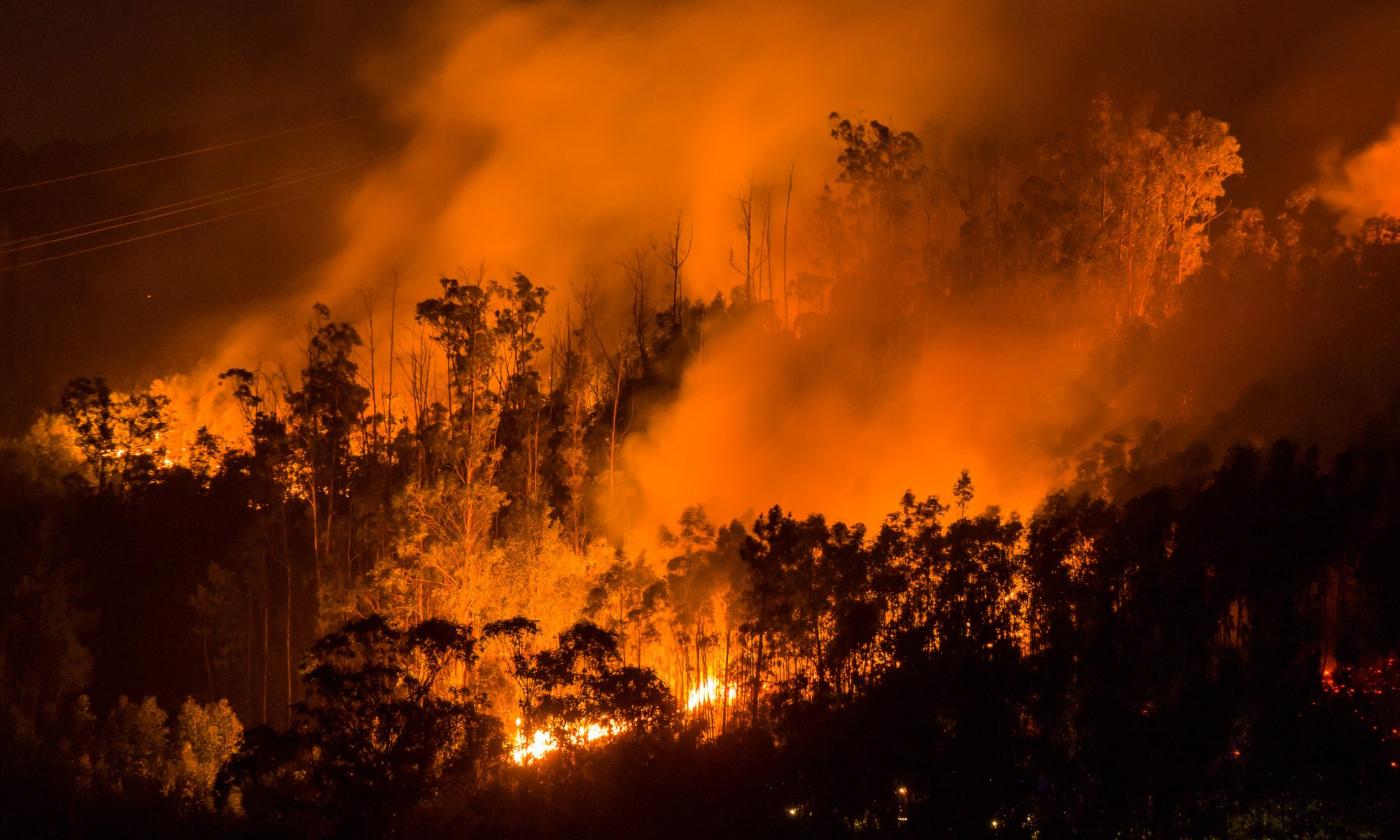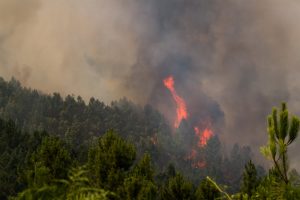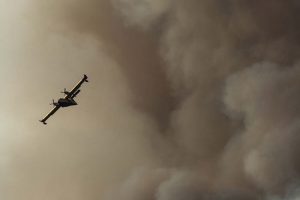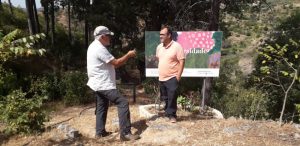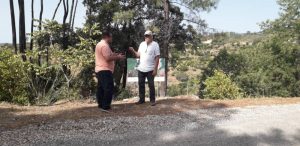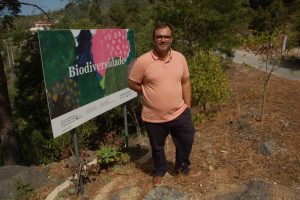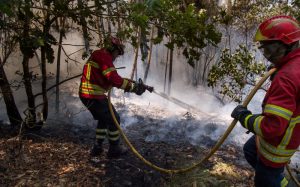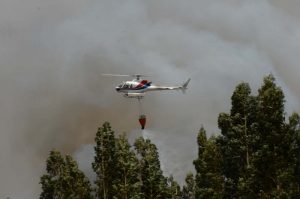We’re at war again ...
by Uwe Heitkamp, Editor ECO123
when what we urgently need is peace. Last Sunday there was a fire not even a kilometre away from our Botanical Garden project in Caldas de Monchique. Someone had deliberately or negligently thrown something inflammable out of a car window. A cigarette, a glass bottle? Who knows? The helicopters are flying attacks on the fire just like in a real war. They are throwing water-filled bombs onto the flames, flying one sortie after the other. It’s like a film about Vietnam. They need two hours, aided by ground troops, to win the battle with the enemy. Just in time, because there is still no wind, with temperatures of between 41 and 43 degrees Celsius. If they manage to extinguish the fire before 5pm we’ll all win that particular war and achieve a fragile peace, as it’s meant to get cooler towards evening. The film ends just in time.
As for ourselves, we hadn’t snuggled down in front of the television set but rather laid out all the available hoses to start to comprehensively moisten the forest. With these temperatures, a lot of water is needed to moisten two to three hectares. This is the price we pay for the carelessness, negligence, ignorance, and wilfulness displayed by people in the cities of this world. Lots of people head out into the countryside for Sunday lunch, and really let rip. Damn, concrete doesn’t burn, somebody once wrote on to a motorway bridge in red paint.
We countryside-dwellers out here love our trees, our forests and their inhabitants big and small: butterflies, foxes, lynxes, mongooses and all the birds and insects, the wild animals, as well as our domesticated ones, the chickens, rabbits, cats and dogs. But last Sunday this feat of holding out in nature only started after 5pm. The winds had been announced, with wind speeds of 60 km/h. At night, the Monchique fire service has a system of guards in place, to save all our lives. Here in Esgravatadouro we take hoses into the forest and moisten the soil until the darkness makes it impossible to see anything anymore. Which is when we pack up and head inside, buffeted by the wind. Meanwhile we are placing all our lives into the hands of the “bombeiros”, who were putting out the last clusters of forest fires here and there with water and hoes, like a city dweller throws a light switch. All of us are delegating our lives to these Guardians of the Peace. I myself patrol our place several times a night. Sleep is difficult to come by; you have to always be ready to immediately turn on the water, and get the sprinklers working. Actually, we’re not completely protected yet; the money for the sprinklers still needs to be earned (www.eco123.info/crowdfunding/).
Life with climate change is a fragile affair. Sometimes you are lucky, just about, another time you’re truly unlucky. The bridge across a dry riverbed is a kind of plank that someone has taken a saw to and which might crack at any moment when we place a foot on it. In the here and now we’ve been living in a democracy for 47 years now (1974 to 2021) and that’s just as well. But the time of the dictatorship lasted for 48 years, from 1926 to 1974. Fascism in Portugal is far from being beaten. And it’s not enough to send a few helicopters with water to put out a fire. Democracy is weak, being threatened every day and in all city halls, including by illiterates who reckon that everything was better back in the olden days. Under Salazar we wouldn’t have had this kind of thing happening.
Really? Have we forgotten that the “Taliban of Portugal” the PIDE shipped dissidents off to the dungeon at Peniche? The key question here is: what can we do to actively defend our democracy from a neo-fascist party? I myself am from a country where fascism held its own for many years, and everyone took part in the Holocaust, actively or passively. Afterwards of course no-one had known anything about it. How phoney! We have all failed in banishing our own personal PIDE from inside of us and from our democracy, from many authorities, universities, our schools, our everyday life. For all those years we did not look after our democracy, electing instead corrupt politicians into well-paid posts. A third of all candidates for the 308 mayoralties have one foot in prison. If we vote intelligently this time, and take a better look at the candidates, if we show up incompetence for what it is and give our vote to the honest candidates, we are strengthening democracy too. ECO123 will support you in this task and submit every democratic candidate to a baptism by fire. This week, it was the turn of the candidate Bruno Estremores; here now is the interview for you to read.
“Eucalyptus was easy money, the green gold, now we need a good present”
ECO123: So tell us, who is Bruno Estremores?
Bruno Estremores: Born and bred in Monchique, I’m 47 years old and a physiotherapist by profession. At the moment I am clinical director at the Hospital Particular do Algarve (HPA) group, with responsibility for the Physical Rehabilitation department.
In July 2020 I was asked to throw my hat in the ring for the PSD’s political commission in Monchique, of which I’ve been an active member for 20 years, to prepare a new municipal project for the 2021 elections. I was honoured to accept the invitation, it’s an interesting challenge, considering I’m an entrepreneur. I set up a small medical clinic in Monchique which has since been integrated into the Hospitais Particulares do Algarve S.A. where I remain in charge of Rehabilitation.
Is it easy or difficult to be the “heir” of Rui André?
Neither. I don’t agree with everything to do with his management, but I understand and support it, especially as regards some measures. When he took on the role of Mayor, he also took on a debt of 13 million to the Bank and ten million to the public health system ADSE. Few people know this. The situation was pretty awful, as without this payment the employees would see themselves refused medical support every time they went to a health service point. Somebody who has to pay off a debt of 22 million over 12 years doesn’t have much left to invest. We can of course consider paying the debt over time and leave part of it to those coming after us…
One of the problems ravaging this territory are fires. As future municipal leader which measures do you have at your disposal to curb or end this problem?
Bringing people to Monchique is fundamental. With people living in the town and in the hills we will see the land cleaned up. It’s pointless having your own plot all clean and tidy if you’re surrounded by land in a state of abandon. We need a proper reorganisation of the forest and emphasise prevention, because spending millions to put out fires will never resolve anything, and cyclically, every five or ten years, nature will rise up again, bringing these fires.
How do you intend to repopulate Monchique?
By providing attractive conditions. By earmarking subsidies for the purchase and rehabilitation of abandoned houses in the town centre for example, saving them from real estate speculation. for the countryside, it will be along fairly similar lines. We have to safeguard against the unhappy situation resulting from the Plano Diretor Municipal (PDM) Municipal Master Plan…
– … which doesn’t exist.
Well, it’s 30 years old and should have been revised ten years ago. This will be our first project.
Rui André had 12 years to review the PDM. With you at the helm, will Monchique get a new PDM?
This will take six to seven years, with the public tender plus the determining factors of Monchique being a part of the Rede Natura 2000, Ecological Reserve and Agricultural Reserve. This means that sometimes, a small plot with a set of ruins on it can derail building works.
But this doesn’t stop the planting of more eucalyptus…
These are the contradictions of Portuguese law.
But the Rede Natura 2000 is European…
Still, those in ministerial offices don’t think of things the way those who are on the ground do, such as the mayors. Those should have a lot more powers (subject, of course, to supervision), most of all in forest reorganisation.
Portugal, Romania and Bulgaria are amongst the most corrupt countries, according to the European Union. How much who-you-know leverage is necessary to be elected?
Politics, religion, football are good things. The problem are the people who at some point in time represent them. We have good politicians and we have politicians who are the worst of society. And we are living in a system where a certain impunity reigns. But I believe it’s still possible to create good things, that we are capable to generate sustainable economic growth, involving a tourism geared towards nature, as part of a network.
On top of the embers?
Obviously not. The damage left over from 2018 has to be dealt with. There has been a great natural regeneration by the ecosystem itself. We have to create measures to deal with species such as acacias. Thirty years ago the idea came up to turn Monchique into a Bioparque, which would be extraordinary. Unfortunately, the idea never left the paper stage, maybe for generating little income. Monchique is a poor municipality, without much revenue outside state support.
Talking about revenue, what is your position on the Monchique Car Park?
At the moment, the Public Prosecutors Office does not authorise anyone interfering with the first floor where we had a fire. But now the origin of the fire has been identified, all that needs to be done is to release the funds. The Park has to be cleaned up and recuperated, because it generates income.
How do you view the threat of CHEGA in Monchique?
There is no threat. The lists of that party only includes four people from Monchique. In contrast to citizens’ movements, parties don’t need signatures. If they achieve 2% of the votes in the Town Council they will receive state subsidies. That’s what they are interested in!
In Monchique people don’t want to know about parties, but about candidates.
What makes you want to become Mayor?
I am able to do a more comprehensive and better job than what’s been done over the past 30 years. Having experience in management and resources has given me the capacity to manage the municipality. Any public entity has to have public service as its mission, but with private management, with well-applied resources.
Do your plans include closing the Hospital, the Health Centre … and to open a private institution?
In Monchique we have elderly people with pensions of 300 euros; opening a private hospital would be a death sentence.
As regards the Health Centre – the building falls under the remit of the municipality, human resources, under the remit of the State – we can’t do much, as local government but exert pressure to have more doctors and nurses. Uu until six years ago, Monchique was one of the foremost health centres, with five doctors; right now, it has two. With the fight against COVID, in practice this boils down to one. At the moment some elderly people won’t go to the pharmacy for their medication because they cannot afford these costs without the prescription. Despite my job, I keep using the Centro de Saúde here in Monchique, where I have my family doctor. We need public services, the State has to fulfil a social function for those who most need it.
Nearly all of use are victims, or aggrieved parties of the 2018 fire and have been waiting for three years for support. How will you deal with this “inheritance” from Rui André?
Sometimes, Rui André’s problem has been bad communication; his intention has always been for the best. The state wanted to make an example out of Monchique. In Pedrogão Grande the government gave the money to rebuild the houses directly to the municipalities.
What is the solution in Monchique?
Without talking to the Social Habitation Institute I can’t tell you. They wanted to hold on to the process and didn’t let the municipality do anything. We’ll have a second problem where local government may be decisive. Reconstruction of the houses is already being approved. Those who were left with nothing but the shirt on their backs don’t have money to commission architectural or engineering projects. If I was to be elected, the municipality will open a public bid, contract architects and engineers to guarantee those projects. There is also the issue of the annexes built beyond the original plans which are not being considered now.
In Caldas, we have a company that bought 37 hectares for seven million euros. They didn’t pay a cent in property transfer tax (IMT). The municipality lost over 500,000 euros in taxes. Was this Rui André’s decision?
No. This was the decision of Monchique town council.
On the suggestion of the Mayor. That money could start a fund to help the victims.
I’m against the exemption for the Caldas de Monchique; if I’d been there I’d have voted against it. Rui André received the company’s proposal to proceed with the exemption, suggested a vote at the Town Council seat, and the majority voted in favour. Who were the deputies voting in favour? Everybody from the Socialist Party (PS), except the President of Alferce parish; on the PSD side there were votes for and against. If you look at relations between the Fundação Oriente (the former owner of the Caldas) and the PS, you will see that the leaders of the PS are the same as those heading that foundation: there must have been some pressure within the party to vote in favour. The million dollar question remains: are you in favour or against?
By nature we should be against it because the other residents[U: ‘municípios’ – es geht doch hier um die Steuerzahler als Personen?] have to pay the tax. But if we’d foreseen that the company would, with this amount of money, restore the Caldas thermal baths, create over 100 jobs, restore the buildings and bring new potential …
But they didn’t… they laid people off.
Yes, it did the exact opposite. We needed a written contract with guarantees for compensation.
We are in a rural area, in the middle of the forest. What are the most important elements in this environment?
In Monchique, the fundamental issue is water. This year it rained a lot, more than in previous years. What did we do to capture this water for use in periods of draught? Zilch. Also because in the winter we have lots of streams we should build small reservoirs – no ponds have been created in Monchique in nearly 25 years – which, beyond serving to water new medronheiro trees, may be used in the event of a fire. It’s completely different for a helicopter to have the pond nearby or having to fly ten kilometres to bring water to the hills.
And in relation to the land, subsistence agriculture?
The economic crisis the Troika brought us also brought us a good thing: many people from Portimão with family in Monchique returned to subsistence agriculture at the weekend. Beyond the economic gain it brought the benefit of keeping the plots of land clean.
It makes me sad to see these terraces – to me, one of the most beautiful things in Monchique – with eucalyptus in the middle. These terraces, built by hand, have to remain in agricultural use.
Do we need less eucalyptus in Monchique?
We need eucalyptus for our economy, but less of it. We also need reforestation.
Several families have started to rip out eucalyptus to reforest with local species. People have implemented solar energy as a source of income.
I’m in favour of reorganising existing species, to create fire contention zones around the town and built-up areas with more fire-resistant species, but in Monchique dozens of companies depend on eucalyptus.
Do we need a plan for a new economy?
Yes, in the sense of living off nature tourism, with new species. Try to reduce the eucalyptus, incentivising and raising people’s awareness to plant chestnut, oak, autochthonous species again. In the olden days, when we got married, a table and chair made of chestnut wood were brought into the marriage. Eucalyptus was easy money, the green gold, but it’s been a bad past, and we have to think of a good present, a good future.
What are we going to do with the asbestos in the schools?
Rui André received two sets of funds to remove the asbestos and to regenerate the schools. Some will be provided with a second floor. If we have little money, it’s a good idea to do those two jobs at the same time. The school at Monchique – whose project for the second floor has already been approved – continues under the jurisdiction of the Ministry of Education, not of the municipality.
At the municipal Escola de Marmelete, works have been granted. The only reason they didn’t start on 12 July was a missing permit from the ACT authority regulating work conditions.
Monchique’s inland location turns it less attractive to building companies. Bringing in workers, setting up the site here increases costings by 20 to 30%. Marmelete local authority has two approved projects for nearly 500,000 euros (a caravan park and a picnic park) and is struggling to find contractors.
Should you be elected Mayor which priority will you give to the restoration of Marmelete school?
Total priority, because Marmelete has more children than a few years ago. This parish has been growing, mostly thanks to the foreign community. The school won’t be ready when lessons begin, only by October.
Bruno, you have two children yourself. Do they go to school in Monchique?
Yes. Given the state it was in, the Escola de Marmelete should not have opened last December. Monchique folks like to criticise, but they have to start being more proactive: go to the right place and state your demands.
Those who take on political office have to be equipped to correspond to the majority of the citizens’ expectations; the authorities have to serve everyone, not just a few.
What does your manifesto say about cultural activities?
We have culture, arts, craftspeople. The problem of the Casa do Povo is that it doesn’t belong to the local authority, but to Social Security. There is a legal issue, similar to the carpark. Maybe the Mayor should leave his office, go to Faro and talk to the relevant people so we can have a small multidisciplinary space for events.
At the moment, the most striking example in Monchique is the Fire Services Headquarters. They’re well equipped in terms of machines and fire-fighting vehicles – in October a new one will be delivered, costing nearly 300,000 euros. But inside water is coming in, the bathrooms are obsolete. We need to provide these workers, as well as the volunteers representing half of the firefighting force, with better conditions. In 12 years the local authority has invested four and a half million euros in the Monchique Firefighters. Considering our revenue, not every municipality has invested that much.
How were these funds used?
On prevention teams, the vehicles… When the current commandant arrived, between broken-down vehicles with bald tyres and debts to suppliers, there was a lot to do. Last week, the anniversary of the association was the first time that Monchique Fire Service received individual protection equipment in 88 years. The last ones were Belgian, bought second-hand.
Nor do we have a Civil Protection Office to coordinate the firefighters, the militaries, the population in case of fire. The Fire Service is not the Civil Protection, they are part of it. Monchique Municipality needs to have a dredging machine[U: ist ein bulldozer gemeint?]. Our old one is not up to the job. We need two or three ever ready to start creating the firebreaks to contain the fire, in the summer; and to clean the paths and cut the fire containment lanes in winter, to contain any fires on the spot.
Many thanks.
